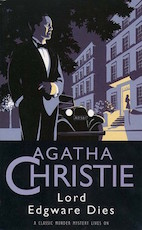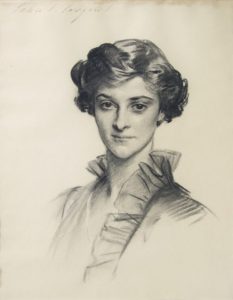
Poirot Score: 80
Lord Edgware Dies
☆☆☆☆
Reasons for the Poirotscore
This has an excellent plot with sufficient clues to solve it. It also has humour throughout, plus vain, brilliant characters from Hollywood films and the theatre. It also is one where Japp takes up most of the hard sleuthing, and is a much larger character in this story than previously. Hastings is discontent their own inaction, but Poirot says ‘Why keep a dog and bark yourself? Japp brings us here the result of the physical energy you admire so much. He has various means at his disposal which I have not.’ This book is a template for future Poirot/Police cooperation.
Click here for Review: spoilers for Lord Edgware AND Peril at End House
Trivia
Dedication To Dr and Mrs Campbell Thompson
In September 1930 Agatha Christie married Max Mallowan, an archaeologist who’d been up at Oxford with her nephew, Jack Watts. She was 37, he was 14 years younger. In 1931 she wrote Lord Edgware Dies mainly in Rhodes. Max Mallowan was on a dig in Nineveh, and Christie’s daughter, Rosalind, was at boarding school in England. Christie finished the book at the end of October in Nineveh, being ‘allowed’ to live at the dig with Max. The head of the dig was Dr Campbell Thompson.
Dr Campbell Thompson was a frugal man, and apparently took exception to Christie buying herself a solid table to put her typewriter on. It is interesting how these heads of digs were so involved in every decision. One could argue it was nothing to do with Thompson how Christie chose to spend her own money on something that was for her benefit: a stable table rather than wobbly packing cases for her writing, in her own accommodation, that didn’t impinge upon the archaeological work at all. Perhaps that is why Christie dedicated the work to him, to prove the table was a worthwhile investment after all? Or, she may have wanted to thank the Thompsons for being so much more reasonable to her than Leonard and Katherine Woolley, the leaders of Max’s previous dig at Ur. Katherine Woolley refused to allow any other women at the site. Christie loathed Mrs Woolley so much, she ‘murders’ Mrs Woolley in a future novel!
Did Christie make a mistake?
The day after Lord Edgware’s murder Poirot and Hastings make a number of visits. The day after that Geraldine Marsh writes to ask them for an interview. In Chapter 18 Hastings does ‘not propose to describe either inquest’, which both must have taken time to arrange. Japp ‘a couple of days later’ comes to see Poirot and Hastings. Yet in Chapter 21 after all these events, so at least a week later, Ronald Marsh confusingly talks about the ‘excursion here last night’ and cashing the necklace ‘this morning’, as though Lord Edgware had been murdered the night before the interview.
Christie’s editor did not spot this time slip.
Jews as depicted in this book
A difficult topic to look at through Christie’s works is the depiction of race and religion. Christie was brought up in Church of England Victorian England. Christie had very liberated un-Victorian views as expressed by her heroines, about women, other nationalities, sex, drugs and religious diversity. Like Shakespeare, Christie was an observer of all human behaviour. What she puts in her books are descriptions of common character types, rather than her own personal authorial moralising. She lets the reader decide.
I was surprised to read Robert Barnard’s quote {A Talent to Deceive – an appreciation of Agatha Christie Fontana Books, 1990; ISBN 0-00-637474-3} “Deals with a social/artistic milieu rather off Christie’s usual beat: aristocrats, actresses, socialites, rich Jews. The anti-Semitism is more muted than in the early thrillers, but still leaves a nasty taste (this is the last book in which it obtrudes)”.
Being Jewish myself, I did not think the portrayal of Sir Montagu Corner offensive in the least. In fact he is described as a Renaissance man, highly educated and interested in all aspects of culture and Science. Einstein’s theory of Relativity was ‘relatively’ new: first published in 1905-1916, but only accepted by academics in the 1920s: so Sir Montegu is at the cutting edge of new Science as well as Art. For a non-scientist this interest in physics is exceptional, and shows Sir Montagu is part of the intelligentsia, not a brainless ‘luvvie’. Similarly Carlotta Adams, who is a Jewess, is also portrayed as sensitive and highly cultured, and caring financially and emotionally for her little sister. Poirot does point out that Carlotta has a “love of money” that might lead her into danger. This induces Carlotta to accept the enormous sum of $10,000 to do the ‘dare’ of impersonating Miss Wilkinson, but this was entirely to earn enough to be able to bring her sister to England. One expects Carlotta and Sir Montegu really did have a wonderful evening of conversation and fine dining together, as they had so much in common.
Some characters in every Christie are motivated by greed, whatever their upbringing, class or religion. Ms Wilkinson we must assume is Christian, although she is presumably married to the Church of England Lord Edgware, and wishes to marry the Anglo-Catholic Duke of Merton. Wilkinson’s complete acceptance to switch from Protestant to Catholic to further her own ends in order to become a Duchess, again illustrates her amoral compass.
The portrayals of Sir Montagu Corner and Carlotta Adams are highly complimentary in the 1930s, in a world turning increasingly Anti-Semitic. You could argue that Christie was trying her best to illustrate to less open minded readers that Jews were decent, highly intelligent, caring, generous people.
The real life Carlotta Adams
 Ruth Draper pencil sketch by John Singer Sargent.
Ruth Draper pencil sketch by John Singer Sargent.
Ruth Draper [1884-1956] was a famous American actress and mimic. Draper is the character on whom Carlotta Adams was based. Ruth did ‘one woman’ shows in the US and Europe to much acclaim. Draper’s second cousin was Paul Phipps, whose daughter, Joyce Grenfell, was greatly influenced by Ruth Draper into pursuing a similar career.
In a letter to Max Mallowan written from Rhodes, Christie writes “Lord Edgware is getting on nicely. He is dead – Carlotta Adams [Ruth Draper] is dead –“.
From this beautiful pencil sketch of Ruth Draper, you can see how accurate Christie’s descriptions are. She describes Carlotta Adams as “Soft dark hair, eyes a rather colourless pale blue, pale face and a mobile sensitive mouth. A face that you liked but that you would find it hard to know again if you were to meet her, say, in different clothes.”
Edgware and Merton
Edgware and Merton are both real places at opposite end of London’s sprawling conurbation. The last station at the north end of the London Underground Northern line is Edgware, at the south end is Morden in the London borough of Merton.
There are no hereditary aristocrats with these names. The names taken from opposite ends of the Northern line cannot be a coincidence, since the characters of Lord Edgware and the Duke of Merton are diametrically opposite. Lord Edgware is described as an evil, middle-aged sado-masochist. The Duke of Merton is dominated by his mother, despite being of age, and is a socially shy, catholic monk-like young man.
Edgware was a Saxon village about 10 miles north of Charing Cross, London. It has long since been swallowed up into London suburbia. The Edgware Road leads from the village of Edgware into central London. It is part of Watling Street, the trackway from North West to South East England, which the ancient Britons had used long before the Romans invaded in the first century AD.
Although people may not have heard of the London Borough of Merton, it contains The All England Lawn Tennis and Croquet Club, in Wimbledon.
Why didn’t they ask Ellis?
In Lord Edgware Dies, in Chapter 27, Poirot is nearly run over by a bus ‘there was a jarring of brakes, and some rich bus driver language.’ Poirot had been transfixed by a chance remark from people leaving a cinema :
If they’d just had the sense to ask Ellis
Ellis, by co-incidence was Lady Edgware’s maid. Suddenly Poirot sees everything, and fortunately was not run over and reaches the kerb ‘in a dignified manner’. I do not think it is a co-incidence that the next book is “Why didn’t they ask Evans?”, the maid…….Clearly Christie got her next idea for her new book.

